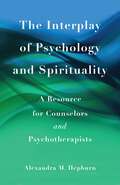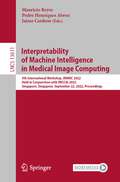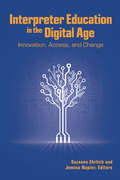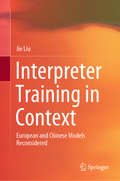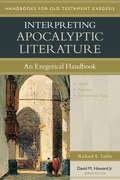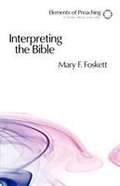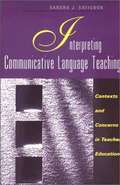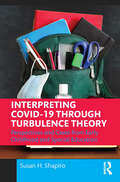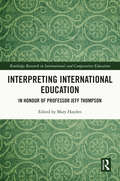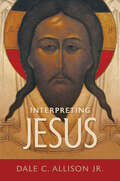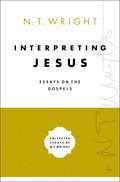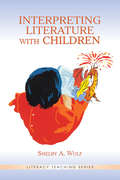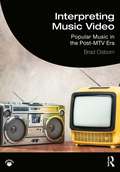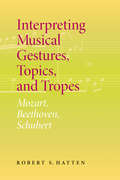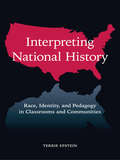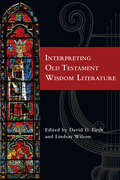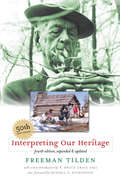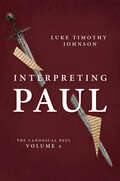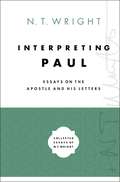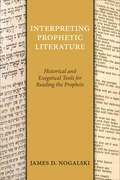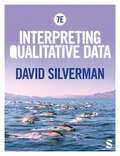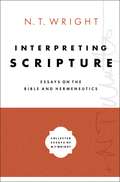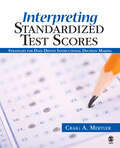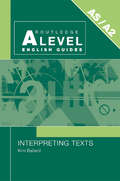- Table View
- List View
The Interplay of Psychology and Spirituality: A Resource for Counselors and Psychotherapists
by Alexandra M. HepburnMany counseling clients find comfort and meaning in their spiritual lives, in the context of religious affiliation or the diverse viewpoints of the &“spiritual but not religious.&” But counselors and psychotherapists often lack training for work in this territory and may be wary of opening the door. The Interplay of Psychology and Spirituality is an exploration of the subtle, fluid relationship between psychology and spirituality that offers valuable perspectives and suggestions for embracing spirituality and religion in the helping professions. Drawing on Jungian, transpersonal, and integral perspectives, Hepburn highlights personal and cultural styles, spirituality as a therapeutic resource, and the potential for psychospiritual growth. She also emphasizes the importance of focusing on metaphors, stories, and direct experience rather than beliefs. Thoughtful attention is given to potential psychospiritual problems, ethical dilemmas, and diagnostic challenges. There are also frequent opportunities for personal reflection. Unique features of the book include consideration of the potential relationship of spirituality to therapeutic themes such as attachment, trauma, subpersonalities, and somatic experience, as well as application of the concepts in the stories of nine fictional characters based on the Enneagram. Thoughtful and thought provoking, The Interplay of Psychology and Spirituality is a valuable resource for helping professionals, spiritual directors, and for general readers with a particular interest in the subject.
Interpretability of Machine Intelligence in Medical Image Computing: 5th International Workshop, iMIMIC 2022, Held in Conjunction with MICCAI 2022, Singapore, Singapore, September 22, 2022, Proceedings (Lecture Notes in Computer Science #13611)
by Mauricio Reyes Pedro Henriques Abreu Jaime CardosoThis book constitutes the refereed joint proceedings of the 5th International Workshop on Interpretability of Machine Intelligence in Medical Image Computing, iMIMIC 2022, held in September 2022, in conjunction with the 25th International Conference on Medical Imaging and Computer-Assisted Intervention, MICCAI 2022.The 10 full papers presented at iMIMIC 2022 were carefully reviewed and selected from 24 submissions each. The iMIMIC papers focus on introducing the challenges and opportunities related to the topic of interpretability of machine learning systems in the context of medical imaging and computer assisted intervention.
Interpreter Education in the Digital Age: Innovation, Access, and Change
by Jemina Napier Suzanne EhrlichThis collection brings together innovative research and approaches for blended learning using digital technology in interpreter education for signed and spoken languages. Volume editors Suzanne Ehrlich and Jemina Napier call upon the expertise of 21 experts, including themselves, to report on the current technology used to provide digital enhancements to interpreter education in Australia, New Zealand, Brazil, Belgium, the United Kingdom, and the United States. Divided into three parts, Innovation, Change, and Community Engagement, this study focuses on the technology itself, rather than how technology enhances curriculum, delivery, or resources. Initiatives described in this collection range from the implementation of on-demand interpreting using iPad technology to create personalized, small-group, multidimensional models suited to digital media for 160 languages; introducing students to interpreting in a 3D world through an IVY virtual environment; applying gaming principles to interpreter education; assessing the amenability of the digital pen in the hybrid mode of interpreting; developing multimedia content for both open access and structured interpreter education environments; to preparing interpreting students for interactions in social media forums, and more. Interpreter Education in the Digital Age provides a context for the application of technologies in interpreter education from an international viewpoint across languages and modalities.
Interpreter Training in Context: European and Chinese Models Reconsidered
by Jie LiuThis book addresses an important, yet under-researched domain in interpreting education: how theoretical training models should be responsive to context. To do so, it applies the linguistic concept of ‘context’ to interpreting studies by investigating practices in representative (conference) interpreting training programmes in Europe and China. After presenting an overview of interpreter training programmes, the author describes the need to reassess the applicability of the well-established and widely accepted model of interpreting from the Paris School (ESIT/AIIC model) to the Chinese interpreting training scene.Building on the theoretical study of context in foreign language classrooms suggested by linguists like Halliday and Hasan (1993); Kramsch (1993) and others, the author subsequently constructs a new curriculum, comprising a four-step approach to consecutive interpreting courses in the Chinese context. The rationale for such an approach is justified in accordance with the overall design of context, taking into account the four dimensions in a teaching–learning environment.This book is intended for scholars and graduate students who are interested in translation and interpreting, applied linguistics as well as foreign language education. It also serves as a practical guide for developing (university-level) translation and interpreting programmes.
Interpreting Apocalyptic Literature: An Exegetical Handbook (Handbooks for Old Testament Exegesis)
by Richard A. TaylorAn appreciation for the rich diversity of literary genres in Scripture is one of the positive features of evangelical scholarship in recent decades.—-David M. Howard Jr., series editorAt one time, Old Testament apocalyptic literature was relegated to the more obscure reaches of biblical scholarship, acceptable to occasionally refer to, but too thorny to delve into deeply. However, in recent decades it has moved to the forefront of research. The rich veins of insight to be mined in the book of Daniel and other apocalyptic texts are being rediscovered. Richard A. Taylor has crafted a handbook to explore those riches and uncover a way to understand apocalyptic literature more fully.Taylor begins with a helpful introduction to the genre; surveys the purpose, message, and primary themes of Old Testament apocalyptic literature; and then discusses critical questions and key works for further study. He also provides guidelines for interpreting apocalyptic texts, followed by Old Testament passages that serve to illustrate those guidelines.While primarily written for pastors and graduate students, Interpreting Apocalyptic Literature is nonetheless accessible to those who simply want to study the texts more deeply than previously possible.
Interpreting The Bible: Approaching The Text In Preparation For Preaching (Elements Of Preaching)
by Mary Foskett O. AllenThis volume provides preaching students and clergy with introductory knowledge of current approaches and methods in biblical studies, familiarity with the questions and aims that pertain to them, and facility with various methods of biblical exegesis. Approaches to biblical interpretation are then examined in light of the questions and concerns that arise specifically in the context of preaching. Methods of biblical interpretation are reviewed and explained in succinct fashion and related directly to the dynamics that give rise to the sermon and shape exegesis for sermon preparation, namely, the preacher's engagement with the text, the author's context, and the congregation. This volume enables preachers to approach the biblical text with greater clarity.
Interpreting Communicative Language Teaching: Contexts and Concerns in Teacher Education
by Sandra J. SavignonThe emergence of English as a global language, along with technological innovations and the growing need for learner autonomy, is changing language teaching rapidly and profoundly. With these changes come new demands and challenges for teaching education programs. This authoritative collection of writings highlights some of the best work being done today in the United States and abroad to make communicative competence an attainable goal. The contributors examine what has come to be known as communicative language teaching, or CLT, from the perspectives of teachers and teacher educators. The book documents current reform initiatives in Japan, the United States, Hong Kong, Taiwan, and continental Europe to provide a global perspective on language teaching for communicative competence. Four major themes recur throughout the volume: the multifaceted nature of language teaching; the highly contextualized nature of CLT; the futility of defining a "native speaker" in the postcolonial, postmodern world; and the,overwhelming influence of high-stakes tests on language teaching. The book is a useful and valuable tool for language teachers, teacher educators, and policymakers.
Interpreting COVID-19 Through Turbulence Theory: Perspectives and Cases from Early Childhood and Special Education
by Susan H. ShapiroThrough the lens of Turbulence Theory, this volume offers students and scholars an innovative toolkit for understanding the COVID-19 pandemic and its impact on teachers, families, and students. Bringing together cases from early childhood and special education written by parents and educators, author Susan H. Shapiro leverages Turbulence Theory as a framework to help readers evaluate the level of turbulence during each scenario and what methods, if any, might help mitigate or escalate the situation. With more than 20 insightful case-based examples and discussion questions, this book explores what lessons and strategies we can bring into future crises—and how we move forward in an ever-evolving educational landscape.
Interpreting International Education: In Honour of Professor Jeff Thompson (Routledge Research in International and Comparative Education)
by Mary HaydenThis book addresses issues and challenges arising in the theory and practice of international education. Written by leading international experts in the field, it draws on up-to-date scholarship relating to this burgeoning area of study. The book reflects research that focuses on the increasing importance worldwide of the international schools sector. Acknowledging the seminal contribution made to development of the field by Professor Jeff Thompson, it discusses topical and fundamental questions relating to international education that are faced by researchers and practitioners. These include the aims of international education, its underpinning philosophy and values, the role of curriculum, the nature of pedagogy in this context and challenges for teaching and leadership. The volume is research-focused and comprises chapters from well-regarded experts based in 11 different countries who have academic and professional experience in teaching and researching international education. As a major contribution to this growing field of knowledge in a rapidly changing educational context, this book will be of great interest to academics, students and researchers in the field of international education worldwide, as well as those with research interests in comparative education and curriculum studies.
Interpreting Jesus
by Dale C. Allison Jr.Timely new essays from a renowned scholar of historical Jesus studies Dale Allison, Jr. has long been recognized as a leading scholar in historical Jesus studies. In Interpreting Jesus, he continues to advance the discussion with the expertise and insight for which he is renowned. Within these highly original essays, Allison explores questions related to Jesus and women, Jesus and miracles, Jesus and Moses, Jesus and the last things, and method in Jesus scholarship. His sound analysis is particularly timely as scholars reconsider the historical figure of Jesus and the relationships among the canonical gospels. Allison&’s keen interest in developing fresh perspectives make this book an important contribution to the field; readers can be grateful that, as he puts it, &“enduring curiosity has kept me pondering the historical Jesus.&”
Interpreting Jesus: Essays on the Gospels (Collected Essays of N. T. Wright #2)
by N. T. WrightInterpreting Jesus brings together N. T. Wright's most important articles on Jesus and the Gospels over the last three decades. Many of the included studies have never been published or only available in hard-to-find larger volumes and journals.Here is a rich feast for all serious students of the Bible. Each essay will amply reward those looking for detailed, incisive, and exquisitely nuanced exegesis, resulting in a clearer, deeper, and more informed appreciation of the recent advances in Jesus studies, and their significance for theology today.
Interpreting Literature With Children (Literacy Teaching Series)
by Shelby A. WolfClearly organized and beautifully written, Interpreting Literature With Children is a remarkable book that stands on the edge of two textbook genres: the survey of literature text and the literary criticism text. Neither approach, however, says enough about how children respond to literature in everyday classroom situations. That is the mission of this book. It begins by providing a solid foundation in both approaches and then examines multiple ways of developing children's literary interpretation through talk, through culture, class, and gender, as well as through creative modes of expression, including writing, the visual arts, and drama. The result is a balanced resource for teachers who want to deepen their understanding of literature and literary engagement. Because of its modest length and price and its ongoing focus on how to increase student engagement with literature, either pre-service or practicing teachers can use this text in children's literature, language arts, or literacy and language courses.
Interpreting Music Video: Popular Music in the Post-MTV Era
by Brad OsbornInterpreting Music Video introduces students to the musical, visual, and sociological aspects of music videos, enabling them to critically analyze a multimedia form with a central place in popular culture. With highly relevant examples drawn from recent music videos across many different genres, this concise and accessible book brings together tools from musical analysis, film and media studies, gender and sexuality studies, and critical race studies, requiring no previous knowledge. Exploring the multiple dimensions of music videos, this book is the perfect introduction to critical analysis for music, media studies, communications, and popular culture.
Interpreting Musical Gestures, Topics, and Tropes: Mozart, Beethoven, Schubert
by Robert S. HattenRobert Hatten’s new book is a worthy successor to his Musical Meaning in Beethoven, which established him as a front-rank scholar... in questions of musical meaning.... [B]oth how he approaches musical works and what he says about them are timely and to the point. Musical scholars in both musicology and theory will find much of value here, and will find their notions of musical meaning challenged and expanded." —Patrick McCrelessThis book continues to develop the semiotic theory of musical meaning presented in Robert S. Hatten’s first book, Musical Meaning in Beethoven (IUP, 1994). In addition to expanding theories of markedness, topics, and tropes, Hatten offers a fresh contribution to the understanding of musical gestures, as grounded in biological, psychological, cultural, and music-stylistic competencies. By focusing on gestures, topics, tropes, and their interaction in the music of Mozart, Beethoven, and Schubert, Hatten demonstrates the power and elegance of synthetic structures and emergent meanings within a changing Viennese Classical style.Musical Meaning and Interpretation—Robert S. Hatten, editor
Interpreting National History: Race, Identity, and Pedagogy in Classrooms and Communities (Teaching/Learning Social Justice)
by Terrie EpsteinHow do students’ racial identities work with and against teachers’ pedagogies to shape their understandings of history and contemporary society? Based on a long-term ethnographic study, Interpreting National History examines the startling differences in black and white students' interpretations of U.S. history in classroom and community settings. Interviews with children and teens compare and contrast the historical interpretations students bring with them to the classroom with those they leave with after a year of teacher's instruction. Firmly grounded in history and social studies education theory and practice, this powerful book: Illuminates how textbooks, pedagogies, and contemporary learning standards are often disconnected from students’ cultural identities Explores how students and parents interpret history and society in home and community settings Successfully analyzes examples of the challenges and possibilities facing teachers of history and social studies Provides alternative approaches for those who want to examine their own views toward teaching national history and aspire to engage in more culturally responsive pedagogy.
Interpreting Old Testament Wisdom Literature: Literature And Themes
by David G. Firth Lindsay WilsonChristopher B. AnsberryCraig G. BartholomewLennart BoströmRos ClarkeKatharine J. DellDavid G. FirthGregory GoswellErnest C. LucasBrittany N. MeltonSimon StocksLindsay Wilson
Interpreting Our Heritage
by R. Bruce Craig Freeman TildenEvery year millions of Americans visit national parks and monuments, state and municipal parks, battlefields, historic houses, and museums. By means of guided walks and talks, tours, exhibits, and signs, visitors experience these areas through a very special kind of communication technique known as "interpretation." For fifty years, Freeman Tilden's Interpreting Our Heritage has been an indispensable sourcebook for those who are responsible for developing and delivering interpretive programs. This expanded and revised anniversary edition includes not only Tilden's classic work but also an entirely new selection of accompanying photographs, five additional essays by Tilden on the art and craft of interpretation, a new foreword by former National Park Service director Russell Dickenson, and an introduction by R. Bruce Craig that puts Tilden's writings into perspective for present and future generations. Whether the challenge is to make a prehistoric site come to life; to explain the geological basis behind a particular rock formation; to touch the hearts and minds of visitors to battlefields, historic homes, and sites; or to teach a child about the wonders of the natural world, Tilden's book, with its explanation of the famed "six principles" of interpretation, provides a guiding hand. For anyone interested in our natural and historic heritage--park volunteers and rangers, museum docents and educators, new and seasoned professional heritage interpreters, and those lovingly characterized by Tilden as "happy amateurs"--Interpreting Our Heritage and Tilden's later interpretive writings, included in this edition, collectively provide the essential foundation for bringing into focus the truths that lie beyond what the eye sees.
Interpreting Paul: The Canonical Paul, volume 2
by Luke Timothy Johnson&“For me, Paul has always been the most difficult and therefore also most delightful advocate and interpreter of the Lord Jesus Christ and of the human experience of God&’s transforming power through Christ. In Paul&’s letters above all I have found the quality of mind and the depth of conviction that could arouse in me both excitement and passion. And it is Paul&’s letters, above all, that show how important and difficult is life together in the church.&”— from the preface With the contextual framework in place from volume one of The Canonical Paul, Luke Timothy Johnson now probes each of the thirteen biblical letters traditionally attributed to the apostle Paul in a way that balances respect for historical integrity with attention to present-day realities. In doing so, Johnson reforges the connection between biblical studies and the life of the church, seeking to establish once again the foundational and generative role that the thirteen letters of Paul have had among Christians for centuries.Far from being a &“definitive theology&” of Paul, or an oversimplified synthesis, Interpreting Paul provides glimpses into various moments of Paul&’s thinking and teaching that we find in Scripture, modeling how one might read his letters closely for fresh, creative interpretations now and into the future. Approached in this way, both in minute detail and as a whole canon, Paul&’s letters yield rich insights, and his voice becomes accessible to all readers of the Bible.
Interpreting Paul: Essays on the Apostle and His Letters (Collected Essays of N. T. Wright #3)
by N. T. WrightInterpreting Paul brings together N. T. Wright's most important articles on Paul and his letters since the publication of his magisterial Paul and the Faithfulness of God in 2013. Many of the included studies have never been published or only available in hard-to-find larger volumes and journals.Here is a rich feast for all serious students of the Bible. Each essay will amply reward those looking for detailed, incisive, and exquisitely nuanced exegesis, resulting in a clearer, deeper, and more informed appreciation of Paul and the relevance of his teaching to Christian life and thought today.
Interpreting Prophetic Literature
by James D. NogalskiExegeting a text--burrowing deep into its history, language, and literary structure--is an indispensable skill for any serious student of the Bible. Given their theological richness and poetic power, the prophetic texts of the Hebrew Bible would seem to be prime candidates for exegetical examination, but they often pose difficulty. In this book, James Nogalski offers solid, practical guidance on how to read and exegete a prophetic text in its literary, historical, and conceptual contexts. Assuming no prior knowledge of Hebrew, Nogalski devises an exegetical method that focuses on the distinctive elements of prophetic literature, rather than on the narrative material one finds in practically all introductions to exegesis. He provides clear examples for understanding poetic texts, prophetic genres, changing voices, and other important aspects of these texts. This book offers essential tools to help readers navigate the particular challenges and opportunities of interpreting the prophets.
Interpreting Qualitative Data
by David SilvermanIn his signature pragmatic and friendly style, David Silverman acts as your stand-in supervisor in the seventh edition of this book, taking you step-by-step through different methods for making sense of qualitative data. Whether you are interested in analysing visual images, interviews, focus groups or online data, this book provides a clear framework for using qualitative data to answer your research questions. The book provides: • A strong grounding in research design principles so you can embed best practice into your research project. • Diverse real-world examples so you can see how principles are applied in practice. • Coverage of new developments in qualitative research including working with online data. If you are new to qualitative research or conducting your first research project in the social sciences, this book gives you the practical grounding in qualitative methods you need to get started.
Interpreting Qualitative Data
by David SilvermanIn his signature pragmatic and friendly style, David Silverman acts as your stand-in supervisor in the seventh edition of this book, taking you step-by-step through different methods for making sense of qualitative data. Whether you are interested in analysing visual images, interviews, focus groups or online data, this book provides a clear framework for using qualitative data to answer your research questions. The book provides: • A strong grounding in research design principles so you can embed best practice into your research project. • Diverse real-world examples so you can see how principles are applied in practice. • Coverage of new developments in qualitative research including working with online data. If you are new to qualitative research or conducting your first research project in the social sciences, this book gives you the practical grounding in qualitative methods you need to get started.
Interpreting Scripture: Essays on the Bible and Hermeneutics (Collected Essays of N. T. Wright #1)
by N. T. WrightInterpreting Scripture brings together N. T. Wright's most important articles on Scripture and hermeneutics over the last two decades. Many of the included studies have never been published or only available in hard-to-find larger volumes and journals.Here is a rich feast for all serious students of the Bible. Each essay will amply reward those looking for detailed, incisive, and exquisitely nuanced exegesis, resulting in a clearer, deeper, and more informed appreciation of Scripture and its application to Christian life and thought today.
Interpreting Standardized Test Scores: Strategies for Data-Driven Instructional Decision Making
by Craig A. Mertler"Craig A. Mertler′s approach would reduce your stress level as his book walks the reader through the various assessments often encountered in schools and helps the reader make better use of the information embedded in accountability reports. The book is well-organized and provides clear and thorough descriptions of the myriad terms the reader will encounter with assessments."—Lane B. Mills, THE SCHOOL ADMINISTRATOR"This text offers a clear, insightful study of how to interpret, use, and reflect on test data in ways that help to develop better schools, highly qualified teachers, and well prepared students."—Linda Karges-Bone, Charleston Southern UniversityAs standardized testing continues to grow in importance in our society, this text will become a critical part of measurement curriculum and instruction."—Gordon Brooks, Ohio UniversityInterpreting Standardized Test Scores: Strategies for Data-Driven Instructional Decision Making is designed to help K-12 teachers and administrators understand the nature of standardized tests and, in particular, the scores that result from them. This useful manual helps teachers develop the skills necessary to incorporate these test scores into various types of instructional decision making—a process known as "data-driven decision making"—necessitated by the needs of their students.Key FeaturesHelps readers understand, interpret, and use standardized test scores to improve classroom instruction: Several specific examples are given for interpreting test scores and developing a plan to revise instruction based on those results.Offers activities for application and reflection: Follow-up activities and discussion points are provided for experienced and preservice teachers across K-12 grade levels.Presents successful case studies: The author includes interviews with classroom teachers, building administrators, and district-level administrators who have successfully engaged in a process of incorporating test scores into decision making.Intended AudienceThis is an excellent supplementary text for any course that incorporates standardized testing as a topic, including but not limited to courses in Classroom Assessment, Educational Psychology, Content Methods, Reading, Special Education, Curriculum, Literacy, Administration, The Principalship, and The Superintendency.
Interpreting Texts (Routledge A Level English Guides)
by Kim BallardRoutledge A Level English Guides equip AS and A2 Level students with the skills they need to explore, evaluate and enjoy English. Books in the series are built around the various skills specified in the assessment objectives (AOs) for all AS and A2 Level English courses.Focusing on the AOs most relevant to their topic, the books help students to develop their knowledge and abilities through analysis of lively texts and contemporary data. Each book in the series covers a different area of language and literary study, and offers accessible explanations, examples, exercises, summaries, a glossary of key terms and suggested answers. Interpreting Texts:* breaks down the barriers which often inhibit the interpretation of texts* explores a wide variety of literary and non-literary examples* covers key skills and topics including discourse, intertextuality and theoretical approaches* guides the reader through the literary, social and cultural aspects of text* can be used as both a course stimulus and a revision tool.Written by an experienced teacher and AS and A2 Level examiner, Interpreting Texts is an essential resource for students of AS and A2 Level.
